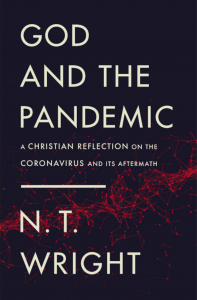 Doubters Book Picks: N.T. Wright, God and the Pandemic: A Christian Reflection on the Coronavirus and Its Aftermath (Zondervan Reflective, 2020). ISBN-13: 978-0310120803.
Doubters Book Picks: N.T. Wright, God and the Pandemic: A Christian Reflection on the Coronavirus and Its Aftermath (Zondervan Reflective, 2020). ISBN-13: 978-0310120803.
“What should the Christian response be to the novel coronavirus pandemic?” “How are we to think about God in the midst of a plague?” “How do we live in the present moment during this lengthening crisis?” “What can the Holy Spirit teach us about ourselves as COVID-19 confronts us?” “How will we recover personally and collectively?”
N.T. Wright, Research Professor of New Testament and Early Christianity at the University of St. Andrews (UK), and former Anglican bishop of Durham, tackles these questions and more in his newest book. Renowned for authoring over eighty previous books, Wright demonstrates why his readers are so loyal to him. God and the Pandemic is written clearly and is chocked full of nuggets of insight into how the resurrection of Jesus from the dead sets the worldwide Christian community on a mission of healthcare and hope during COVID-19’s ravages.
He offers clear pathways through the scriptures of the Old and New Testaments to help us understand the works and ways of God during this awful crisis. Above all, the entire event of the life-death-resurrection-ascension of Jesus teaches two truths during this time of suffering. First, the Risen Jesus offers us no simple solutions or “end-times” secrets for facing these public health, political, and economic troubles. God-in-Christ mandates that we walk the way of love and justice NOW, not glomming onto the vacuous hysteria of deluded and deluding speculators about the end-times. The whole Christ event laid out in the Gospels points us to Jesus’ signs of hope and new creation in every present moment, virus or no virus. When Jesus heals, proclaims justice, raises the dead, multiplies food for the hungry, and calls disciples to follow him, he sets us on the path of deeds of mercy and love in the here-and-now, not the sweet-bye-and-bye.
Second, the way of mission for Christian community to the suffering world, both historically and in the here-and-now, leads from the spiritual power of lament, through the risk of discipleship that may cost Christians dearly, into public acts of worship and deeds of practical help that transform us into signs of hope for all people. Over and over, Wright shows how the earliest followers of Jesus began caring for multicultural people throughout their world, innovating care for the sick and dying regardless of personal risk. We learn from Wright how Christian confession and discipleship matter-of-factly move into the pandemic crisis in everyday acts of hope, pointing everyone toward a new creation on this planet. With characteristic, simple prose, Wright cuts directly to the chase: “…The argument hinges, not on any independent events, not on some big crisis that’s just occurred, but on the facts concerning Jesus himself” (p. 37). That is how followers of Jesus face the pandemic: together in the name of Jesus.
This book may be read in a single sitting, but is likely to linger in our memories throughout the COVID-19 crisis and well beyond.
– Stephen V. Sprinkle, Theologian-in-Residence

